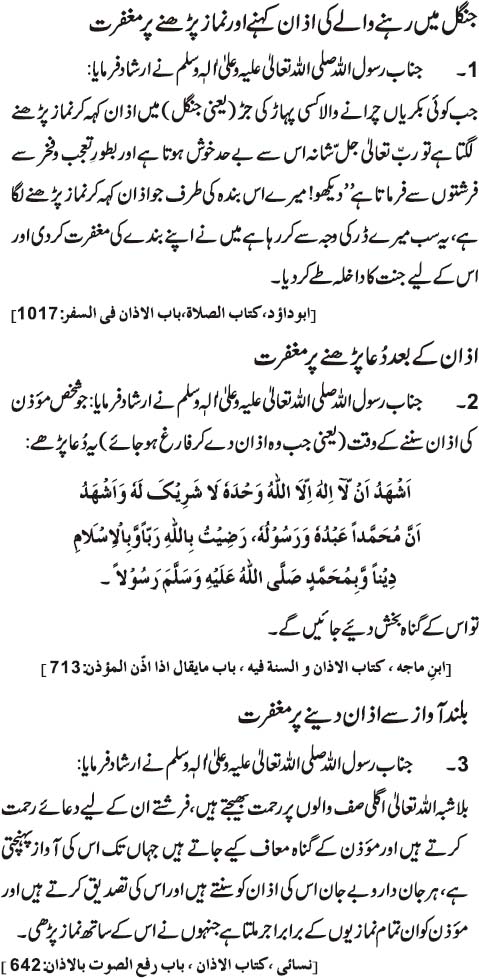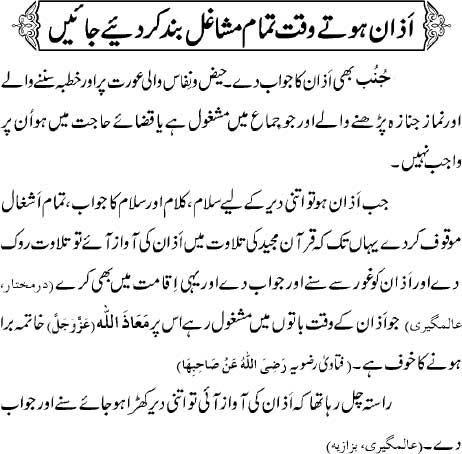
Azan Kehne Aur Azan Kay Baad Dua Parhne Par Maghfirat
TAG: Azan
Husn-e-Khatima: Azan Ki Dua

Husn-e-Khatima: Azan Ki Dua
Azan Ki Sunnatien

Azan Ki Sunnatien
Ahad Ahad: Bilal Radhiyallaho `Anhu
Bilal (Radhiyallaho Anhu) is one of the Best known of the galaxy of ‘Sahabah’ as ‘Moazzin’ of the Prophet (Sallallaho `alaihe wasallam) ‘Masjid’. He was an Abyssinian slave of a disbeliever in Mecca. His conversion to Islam was, naturally, not liked by his master and he was, therefore, persecuted mercilessly.
Ummayah bin Khalaf, who was the worst enemy of Islam, would make him lie down on the burning sand at midday and would place a heavy stone on his breast so that he could not even move a limb…! he would then say to him…
‘Renounce Islam or swelter and die.’
Even under these afflictions, Bilal (Radhiyallaho Anhu) would exclaim…
‘Ahad’ The One Allah! ‘Ahad’ The One Allah!
He was whipped at night and with the cuts thus received, made to lie on the burning ground during the day to make him either forsake Islam or die a lingering death from wounds. The torturers would get tired and take turns… Abu Jahl, Umayyah, and others would vie with one another in afflicting more and more painful punishments …but Bilal (Radhiyallaho Anhu) would not yield. Subhan Allah!
At last Abu Bakr (Radhiyallaho Anhu) bought Bilal’s (R.A.) freedom, and he became a free Muslim…! As Islam taught implicitly the oneness of the Almighty Creator, while the idolaters of Mecca believed in many gods and goddesses with minor godlings, therefore Bilal (Radhiyallaho Anhu) repeated…
‘Ahad (The One), Ahad (The One).’
This shows his love and devotion to Allah. Allah was so dear to him that no amount of persecution could distract him from reciting His Holy name. It is said that the urchins of Mecca would drag him in the streets, with his words ‘Ahad’ ‘Ahad ‘ ringing in their wake.
Look how Allah rewarded his steadfastness…! He was to have the honor of becoming the Prophet (Peace be upon him) Moazzin. He was always to remain with him at home and abroad to call out the Azaan for his ‘Salaat’.
After the Prophet’s (peace be upon him) death it became very hard for him to continue his stay in Madinah where he would miss him at every step and in every corner…He, therefore, left Madinah and decided to pass the rest of his life striving in the path of Allah. Once he beheld the Prophet (Sallallaho `Alaihe Wasallam) in his dream saying to him…
‘O, Bilal! How is it that you never visit me?’
No sooner did he get up than he set out for ‘Madinah’. upon reaching there, Hasan and Husain (Radhiyallaho anhuma) The Prophet’s (Sallallaho `Alaihe Wasallam) grandsons requested him to call out the ‘Azaan’.
he could not refuse them, for they were very dear to him. But as soon as the ‘Azaan’ was called, the people of Madinah cried openly out of their anguish at the memory of the happy old days of the Prophet (Sallallaho `alaihe wasallam) time. Even the women came out of their houses weeping. Bilal (Radhiyallaho Anhu) left Madinah again after a few days and died in Damascus in 20 A..H.
Notes:
The great devotee and Muazzin of PROPHET( SALLALLAHO `Alaihe Wa Sallam) the courageous and beloved Abyssinian by the name of Bilal Habshi (Radhiyallaho Anhu) passed away in the middle of reading ‘Azaan’ in Damascus, Syria between the years 638 and 642 (AD). This was the second time after the death of PROPHET( SALLALLAHO `ALAIHE WASALLAM) that BILAL( Radhiyallaho Anhu) recited the Azaan.
Azan Kay Ahkam


Azan Kay Ahkam
Azan Kay Waqt Tamam Mashaghil Tark Kar Dein

Azan Kay Waqt Tamam Mashaghil Tark Kar Dein
Kaaba Ki Chat Par Azan

Kaaba Ki Chat Par Azan
by Hafiz Muhammad Idrees
The Superiority Of Supplication At The Time Of Azan, Iqamah, And Saalatul Jumma
Allahumma Salli Ala Sayyidina Muhammadin Wa-Ala Ali Muhammadin Wa-Sabibi Wa-Sallim
YA GHAWTHU’L-A’ZAMU AGHITH-NI FI KULLI AHWALI WA’NSUR-NI FI KULLI AMALI WA TAQALLAB-NI FI TARIQI-KA BI-HURMATI JADDI-KA MUHAMMDINWA BI-SHIFA’ATI-HI WA RUHI-HI WA SIRRI-H.
Hazrat Anas Ibn Malik has said, our Nabi has said: “The dua is never refused between the azan and the iqamah, so call unto Allah.”
Hazarath Anas Ibn Malik has said, our Nabi has said: “When the call for Salah is made, the heavens doors open, and the duas are accepted.”
Hazarath Abu Hurairah has said: “I came to the mountain of Thoor and I met a Rabbi. I spoke to him about Nabi and he spoke to me about the Torah. We did not disagree on anything right until we completed our conversation, and I said to him: “The Messenger of Allah has said: On the day of Jum-ah, there is a time that if a believer gets it, there is nothing good he asks Allah for, except that it will be granted to him! The Rabbi asked, “In every year?” I said: but in every Jum-ah, that is what the Messenger of Allah said!”
So he went away for a little while, then he returned to me, and he said: ” You have spoken the truth, By Allah, It is like the Messenger of Allah said, it is every Jum-ah and indeed (Jum-ah) is the greatest of days, and the dearest of days to Allah, in it Adam was created, and in it, he was placed in Paradise, and in it, he was expelled from paradise and in it will the day of Ressurection, and there is no animal except that it is…, and it waits for the day of Jum-ah, except Man and Jin.”
Amar Ibn Auf Muzni narrated from his father who narrates from his grandfather, that Rasulullah has said: ” Indeed on the day of Jum-ah there is time, no servants ask for anything, except he will be granted what he asks.” It was said to him “Which time is it O’ Messenger of Allah?” He replied: “The salah time until the people return from it”
Hazrath Jabir Ibn Abdullah says that our Nabi said: ” The Messenger of Allah supplicated in the musjid at the battle of the Trench on Monday, Tuesday, Wednesday, and his call was answered on Wednesday between the two salaahs, face (at that time. Hazrath Jabir Ibn Abdullah says from himself: “So nothing of importance had ever come upon me, except that I waited that particular time of that day, except that I asked, and I knew of the answer to my supplication.”
Hazrath Abu Hurairah has stated that the Messenger of Allah said: “When you hear the crow of a rooster, then ask Allah for his favors, for verily the rooster had seen an angel of Allah, and whenever you hear the bray of an ass, then seek protection in Allah from the Shaitaan, for verily the ass had seen the shaitaan.” (Hazrath Imam Mawawi explains the reason for this supplication. The angels ask forgiveness for the son of Adam and they say Ameen for his Duas!)
Azan And Iqaamah (Call To Prayer)
To give the Azaan for Salah is proven from the Holy Quran-e-Majeed. Almighty Allah says in the Glorious Quran: “And when you call the Azan for Salah”.
The Ulema have stated that to give Azaan for the five daily Salaah including Jummah Salah, is Sunnat-e-Mu’akadah and if the Azaan is not given by anyone, then the people of the entire area are sinners individually. With the exception of the Fardh Namaaz, there is no Azaan for the two Eids, Witr, Janazah Salaah, or any Nafil Salaah. The time for Azaan is the same time as that of Namaz. It is not permissible to give any Azan before the time of that particular Salah.
One who gives the Azan must be a Sunni Sahihul Aqeedah person who is in his proper sense of mind. If Azan is given without Wudhu, it will be complete, but it is not correct to do so. It is not permissible for a person who is in an impure state, an insane person, an intoxicated person, or a Faasiq (open sinner) to call out the Azan. It is Makrooh-e-Tahreemi for women to give the Azaan or Iqaamah. Azan must be given standing facing the direction of the Qibla, with the index fingers in the ears. The Azan must be called out with a loud voice, pausing after each Takbeer. The Azan must be given outside the actual Musjid and not inside as this is Khilaaf-e-Sunnah (against the Sunnah) and Makrooh. This law even applies to the Azaan of the Jummah Khutba. Azan should not be given in front of the Mimbar, but outside the main Musjid, but standing in line with the Khateeb.
To reply to the words of Azan is Mustahab. When the Mu’azzin says, “Hayya Alas Salaah” and “Hayya Alal Falah”, then you should say, “Laa Howla Wa laa Quw’wata illa Billahil Aliyul Azeem”. In the Azaan of Fajr, when the Mu’azzin says, “As Salaatu Khairum minan Naum”, then you should say, “Sadaqtu Wa Barartu”.
It is not allowed to give an answer to the Azan during the Khutba of Jummah. It is important to remain silent and listen to the Khutba. When Azan is read, all talking should stop. Even if a person is reciting the Quran, he should stop and answer the Azan. Even when walking on the street, one should stop and give answer to the Azan when it is heard. If in your area, you are able to hear the Azan of various Masaajid, then you should answer the first Azaan that you hear. In one Hadith, The Holy Prophet (sallal laahu alaihi wasallam) stated: “Freedom from the fire of Hell is written for that Muslim who calls out the Azaan for seven years.”
Benefit In The Answer To Azan:
Once while speaking to a group of women Huzoor-e-Anwar (sallal laahu alaihi wasallam) said: “When Hazrat Bilal (radi Allahu anhu) calls out the Azan and Takbeer, then say as he says, since for every Kalma (word) Almighty Allah will bless you with one hundred thousand good deeds, He will exalt your status by one thousand folds and He will forgive your one thousand sins”. The women then asked, “And what is (the reward) for the menfolk ?” The Prophet (sallal laahu alaihi wasallam) replied, “Double that amount.”
Let us take some time to ponder on this fact, in the Azan of one day, there are seventy-seven words, and in the Iqaamah of one day, there are 85 words. If the Sawaab for the women was so great then imagine it being doubled for the men. Then think that this is for one day, what is the Sawaab of that person whose daily practice this is. Subhan-Allah!
Dua After The Azan:
“O Lord of this beautiful Azan and the Salah which will follow, give our Master Muhammad (sallal laahu alaihi wasallam’s) Wasila and greatness and a very high station. And let him reach the Plain of Mahmood of which You have promised him and let us receive his Intercession on the Day of Qiyamah. Without doubt, You never go against Your Promise.”
Other Instances Where Azan Can Be Given:
With the exception of Namaaz, it is also Mustahab (desirable) to give Azan in the following instances:-
- To give Azan at times of fear brings tranquillity.
- During an uncontrollable fire. Insha-Allah, the fire will be quickly extinguished.
- Azan can be given in the ears of a person to remove fear and sadness.
- At the birth of a child, Azan should be given in the right ear and Iqaamah in the left ear.
- Azan can be given at the grave-side to give Sukoon (tranquillity) to the deceased.
- Say Azan to cure somebody who is affected by Jinnaat or Shaitaan.
- During the time of the storm.
- To ask for rain during drought, or to stop a heavy storm.
- When lost in a forest, by saying Azan, someone will show you your way.
- Saying Azaan in your business or residence will increase Barakah (blessings).
Iqamah(Takbeer)
The Takbeer or Iqaamah that is called out after the Azaan and before the Jamaah is also like Azan except for a few differences in Azaan and Iqaamah:-
- Iqaamah is given inside the Musjid and Azaan is given outside the Musjid.
- Takbeer is given softly and Azan is given loudly.
- During Takbeer, the fingers are not placed in the ears.
- Takbeer is read rapidly.
- Takbeer for Fajr does not have the words “As Salaatu Khairum minan Naum”.
- In Takbeer, “Hayya alal falaah” is followed by “Qad Qaamatis Salaah”.
- In answer to “Qad Qaamatis Salaah” at least say: “Aqaamuhallahu Wa Adamahaa”
- Takbeer must be said by the Mu’azzin and through his permission, someone else will be allowed.
- To stand during Takbeer is Khilaaf-e-Sunnah. The Imam and Muqtadi should sit during Iqaamah and only stand when the Mu’azzin says “Hayya Alas Salaah” – “Haya Alal Falaah”.
The Call For Prayer: Azaan
Yahya narrated it on the authority of his uncle that he had been sitting in the company of Muawiya bin Abu Sufyan (may Allah be well pleased with them) when the ‘Muazzin’ called (Muslims) to Prayer. Muawiya said: I heard the Messenger of Allah (PBUH) saying “Muazzin’s will have the longest necks on the Day of Resurrection. (They will be the more deserving of Allah’s mercy and reward) (Sunan Abu Dawood)
The Holy Prophet (PBUH) has said: “Whoever proclaims the “Azaan” for 7 years, for the sake of reward, Allah keeps him secure from the fire of hell.” (Tirmizi, Ibn Majah)
The Holy Prophet (PBUH) has said: “The one who proclaims the “Azaan” only seeking reward, is like the blood-stained martyr – and when he dies, his body will be safe from insects.” (Bahaare Shariat from Tibrani)
It is an Emphasised Sunnah (Muakkadah) to proclaim the “Azaan” for offering Obligatory Prayers in the mosque. This command is like an Essential (Wajib) in the sense that if the “Azaan’ is not proclaimed, the entire community residing there will be offenders. It is undesirable (Makrooh) to proclaim the ‘Azaan’ without ablution. The ‘Azaan’ for each Obligatory Prayer can be proclaimed after the time starts for each respective Prayer. An ‘Azaan’ proclaimed prior to its time must be repeated in its due time.
Islamic Law (Shariah) has some specific words for the ‘Azaan’ (the Call for Prayer), which are as follows:
Allahu Akbar: Allahu Akbar: Allahu Akbar : Allahu Akbar
Ash-hadu al-laa ilaaha illAllah: Ash-hadu al-laa ilaaha illAllah
Ash-hadu anna Muhammadar-Rasoolullah: Ash-hadu anna Muhammadar-Rasoolullah
Hayya alas-Salaah: Hayya alas-Salaah
Hayya alal-Falaah: Hayya alal-Falaah
Allahu Akbar: Allahu Akbar
Laa ilaaha illAllah
Allah is the Greatest, Allah is the Greatest, Allah is the Greatest, Allah is the Greatest
I bear witness that there is no God except Allah, I bear witness that there is no God except Allah
I bear witness that Mohammed is the Messenger of Allah, I bear witness that Mohammed is the Messenger of Allah
Come towards Prayer, come towards Prayer; Come towards Success, come towards Success
Allah is the Greatest, Allah is the Greatest; there is no God except Allah!!
While saying “Hayya alas-Salaah Hayya alal-Falaah” in the ‘Azaan’ or in the ‘Iqamah’, one must face right and left respectively. Upon hearing the ‘Azaan’, it is commanded to reply to it – i.e. to repeat the words which the Caller (Muazzin) is saying, except for the words ‘Hayya alas-Salaah Hayya alal-Falaah’, for which one must say “Laa hawla wa laa quwwata illaa Billah” (There is neither power nor strength, except with Allah).
In the ‘Azaan’ for the Dawn Prayer, the Caller must say the following words twice after “Hayya alas-Salaah Hayya alal-Falaah” – “AsSalaatu Khairum-minun-Naum” (Prayer is better than sleep). The response to these words is “Sadaqta wa bararta, wa bilHaqqi Nataqta” (You have confirmed the truth and you did well – and you have spoken a fact.)
While the ‘Azaan’ is being said, one must not indulge in any talk, recite Quran, etc., nor indulge in other activities. Listen to the Azaan attentively and reply to it. The same applies to the Iqamah. For the one who stays engrossed in talk while the ‘Azaan’ is being proclaimed, there is a danger of him dying an evil death. (We seek Allah’s refuge)
When the Caller proclaims “Ash-hadu anna Muhammadar-Rasoolullah”, one must respond by sending peace and blessings upon the Holy Prophet – “SallAllahu alayka yaa Rasool Allah” (Allah’s blessings be upon you, O the Messenger of Allah).
The words proclaimed to announce the beginning of the congregational Prayers (with Jamaat), are called “Iqamah’. All words are the same as in the “Azaan’, except that after the second “Hayya alal-Falaah”, the following words are said twice – “Qad QamatisSalaah” (The Prayer has been established). In response to this, one should say “AqamahAllah wa adamaha maa damatiSamawate walArd” (May Allah keep it established, and grant it permanence as long as the skies and the earth remain.)
It is undesirable (Makrooh) for a person who comes in at the time of “Iqamah” to remain standing and wait – he should sit down and stand up only when the Proclaimer (Mukabbir) has announced “Hayya alal-Falaah”. Likewise those who are already present in the mosque must stand up at this moment. The same applies to the Imaam.
If several Azaans are heard, the listener must reply to the first one, and it is better if he replies to all. The ‘Azaan’ for the Sermon (Khutbah) must not be replied to by those who pray behind the ‘Imaam’ in the congregation. (The follower is called Muqtadi).
After the Azaan, one must send blessings upon the Holy Prophet (PBUH) and then supplicate as follows:
Allahumma rabba haazihi-daawatit-taammate was-salaatil-qaaemate aate sayyedenaa Muhammadan-ilWaseelata walFadeelata wad-darajatar-rafeeata wabas-hoo maqaamam-mahmoodanil-lazee wa-attahoo warzuqnaa shafaatahoo yawm-alqiyaamate, innaka laa tukhleful-meeaaad.
(O Allah, the Lord of this perfect call and of the Prayer to be established !! Grant our leader Hazrat Mohammed, the highest point in Paradise, and Excellence, and the highest rank, and install him on the praiseworthy position which You have promised him – and grant us his intercession on the Day of Resurrection. Indeed You do not go against Your promise.)

